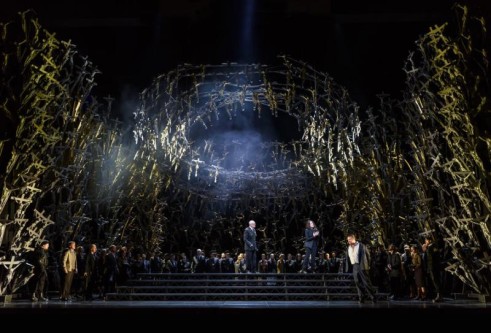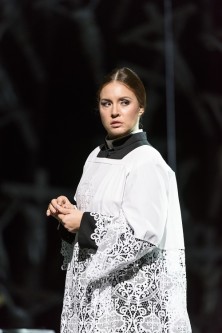 United Kingdom Bellini, Norma: Soloists, Chorus & Orchestra of the Royal Opera House, Covent Garden / Antonio Pappano (conductor). Royal Opera House, Covent Garden, 12.9.2016. (CC)
United Kingdom Bellini, Norma: Soloists, Chorus & Orchestra of the Royal Opera House, Covent Garden / Antonio Pappano (conductor). Royal Opera House, Covent Garden, 12.9.2016. (CC)

Cast:
Norma: Sonya Yoncheva
Pollione: Joseph Calleja
Adalgisa: Sonia Ganassi
Oroveso: Brindley Sherratt
Flavio: David Junghoon Kim
Clotilde: Vlada Borovka
Norma’s Children: Niamh Worrell, Matteo di Lorenzo
Production:
Director: Alex Ollé (La Fura dels Baus)
Associate Director: Valentina Carrasco
Set Designer: Alfons Flores
Costume Designer: Lluc Castells
Lighting Designer: Marco Filibeck
This was the arrival of the first Norma at Covent Garden for decades (1987, to be precise) to open the 2016/17 season. Those disappointed by the non-arrival of Netrebko as Norma need not have felt too wronged, for Bulgarian soprano Sonya Yoncheva gave an all-out performance of Bellini’s extraordinary masterpiece. Disappointment was to be found elsewhere: the production is brave, and fabulously executed, but misconceived. The Catalan collective La Fura dels Baus has quite a reputation, and technically they are impeccable, but it was difficult to escape the impression of cleverness for cleverness’ sake.
This is, famously, an opera with as its central character a Druid priestess. So having Norma dressed in Roman Catholic regalia, performing a Christian act of worship was bad enough, instantly bringing to mind the Vicar of Dibley (itself presumably unintentionally highly ironic given the actress who plays said Vicar has distinctly Paganist leanings). To have the entire forest made up of a thicket of crucified Christs instead of twigs and branches was a step too far. Later, those crucifixes come together to imply a huge crown of thorns. Druids are big on trees, so much so that they have a tree alphabet (called Ogham); Jesus was probably less of a fan, all things considered, given the method of his demise. I’m all for the locating of the common origins of religious thought, but I really do suspect that had nothing to do with this. It all felt unsettled as a concept and, while clever, was uncomfortable.
There is something of the closed religious secrecy in the leader Oroveso, brilliantly delivered by the experienced Brindley Sherratt (although this is no mystic secret society). A giant censer spews incense as “Casta Diva” issues forth from the pulpit (because Druids have pulpits, right?); the ending of the opera as a whole now involves a whole reworking of the heroine’s demise. There is also a decided creepiness as the religious headwear, while accurate, inevitably references the Ku Klux Klan. The depth of pagan connection as the Druids of ancient Gaul fight the Roman occupiers is lost, a depth of connection to Nature that continues to today, replaced by an impressively clever idea that seems to have limited shelf-life. One wonders how much profundity would emerge from this production on repeated viewings.
The arrival of wide-screen TV and modern front room amidst the forest for Act 2, although it raised an eyebrow, seemed of little consequence given the workings of the first act. The showing of what looked like “Watership Down” on the TV drew the eye, once located never forgotten no matter how hard one tried. Scalextrics and Space Hoppers hint at a specific time. The opera’s end was hardly textbook, either. Eminently believable flames (no surprise from this source) implied incineration, nay, immolation; without wishing to spoil everything for readers who may be going, suffice it to say there is a gun involved instead for one of the characters.

Musically, things could hardly be more different. Pappano drew the very best from the Covent Garden orchestra, his sense of line impeccable. He is a singers’ conductor, allowing the line to breathe naturally, giving Yoncheva all the space she needed in her spell-binding “Casta Diva”. The burnished strings, the sprung rhythms, the superb sense of ensemble, all pointed towards a concerted effort and an orchestra that trusts and perhaps even loves its conductor. Yoncheva excelled everywhere, especially in “Casta Diva”. Making her ROH debut as recently as 2012 (and returning later in the season to sing Antonia Les Contes d’Hoffmann), this was all of a performance, dramatic and powerful yet capable of heart-breaking tenderness. Her greatest test was to stand up to history, perhaps, as predecessors in this role include Callas and Sutherland, and while the frisson factor was never quite up there, this was a superb assumption of the role. Yes, there is some way to go to the truly great performance, and perhaps that is what Netrebko-ites might have expected, but Yoncheva nevertheless was totally able to dominate the stage.
Her Adalgisa, the love rival and young Priestess, was the superb Sonia Ganassi. Together, their voices worked perfectly. So to the male lead, that of Pollione, here taken by star name Joseph Calleja, who took a little while to properly hit stride but when he did showed a heroic side to his voice that was most impressive.
David Junghoon Kim was an acceptable if not outstanding Flavio, friend to Pollione, while Vlada Borovko was a fine Clotilde (Norma’s confidante). The true star remained the orchestra, as fine as I have ever heard it, marshalled by Pappano’s impeccable grasp of the score. In February this year, Jim Pritchard reviewed English National Opera’s Norma, which also failed to step up to the plate.
Colin Clarke
Check the listings at your local cinema for a live transmission of this Norma on 26 September.

‘Norma’ in Roman Catholic regalia and rites and women priests? Was someone trying to make a point here? Bringing these old stories into modern times that makes no sense smacks of stupidity at best and only takes away from the beautiful music and vocal talent of the artists. Close your eyes on this one and enjoy a great performance.